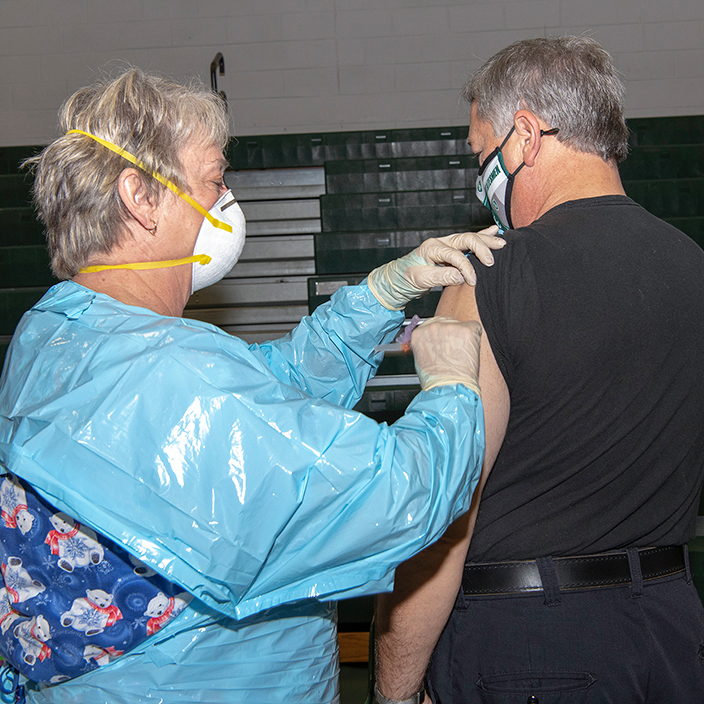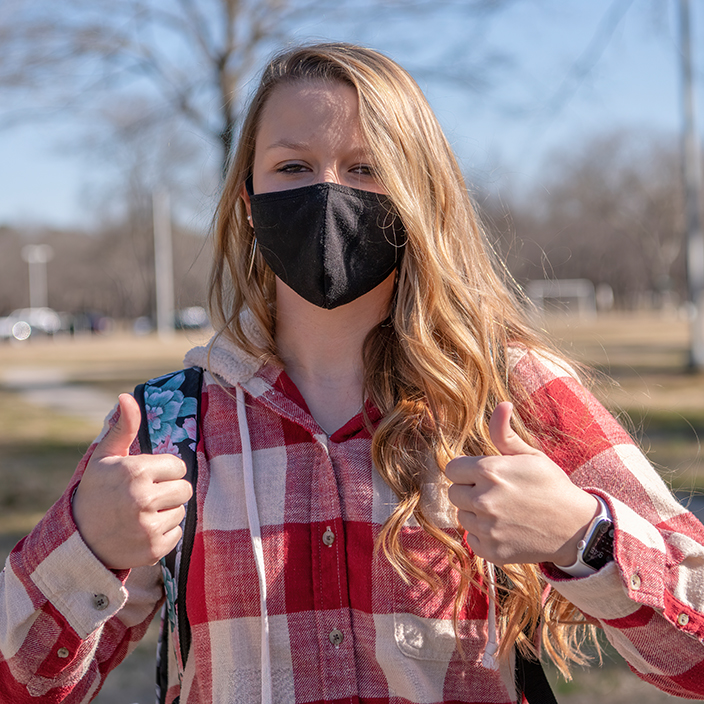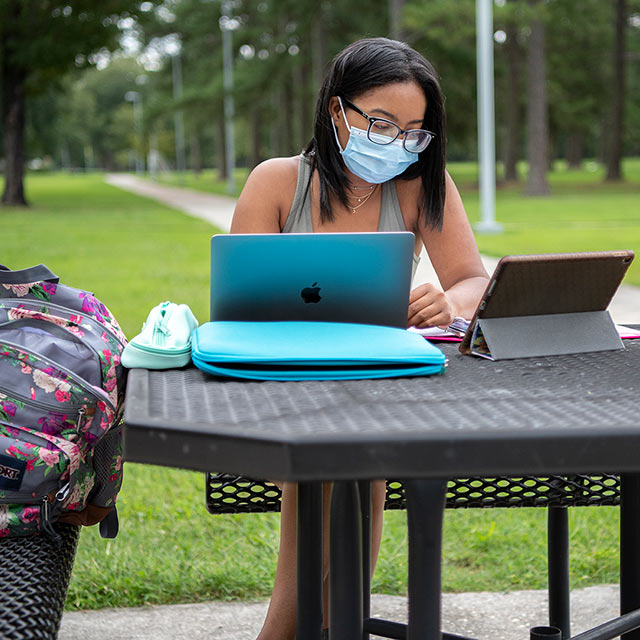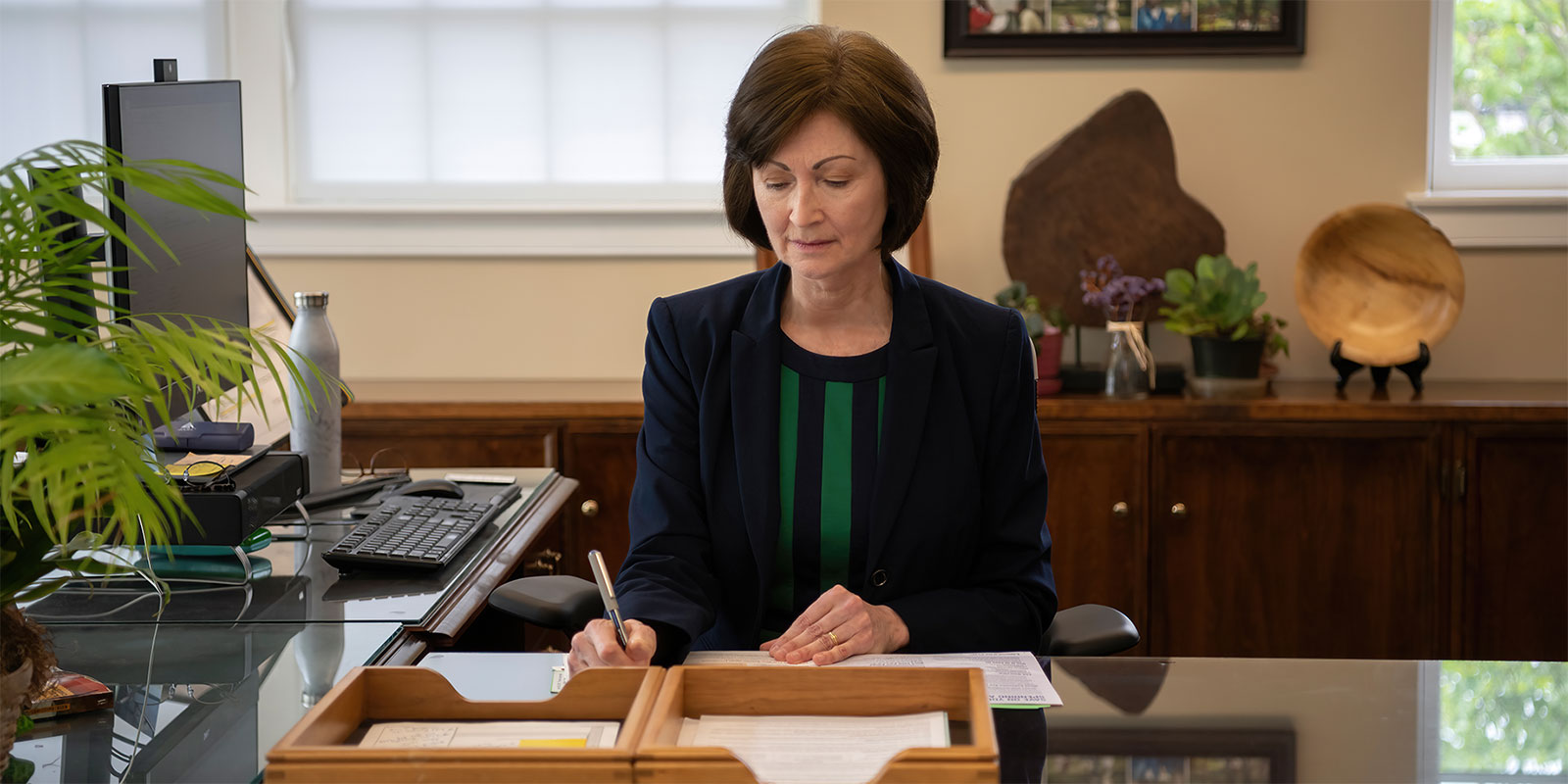Safe and Secure Plan 2022
All classes on Tuesday, January 18 through Friday, January 21, will take place virtually
Effective Date: August 16, 2021
Updated & Revised: December 10, 2021, January 3, 2022, March 4, 2002
The goal for the Spring Semester 2022 is to continue to provide the RBC community with a safe learning experience using proven mitigation strategies to prevent the spread of the COVID-19 virus and its variants. The College will continue to provide opportunities for in-person interactions, participation in unique traditions, and involvement in myriad activities, clubs and athletic events. To achieve that end, the Safe and Secure Task Force has worked with Crater Health District, as well as reviewed and applied local, state and federal health guidelines for the development of the Safe and Secure Plan for the Spring Semester 2022.
Click here for a .pdf of the Spring 2022 Safe & Secure Plan
Vaccinations
The Richard Bland College continues to strongly encourages all students, faculty and staff, who are physically accessing campus services and classes to be fully vaccinated for COVID-19. Research continues to support the safety and efficacy – along with extreme effectiveness – of the COVID-19 vaccines authorized for use by the Federal Drug Administration (FDA) and World Health Organization (WHO). Widespread vaccination is the best tool we have to ensure that RBC can continue with an in-person academic and social environment in the spring of 2022.
On January 15, 2022, the Governor rescinded Executive Directive Number Eighteen that required all state employees who are in the work place or have public facing work duties to disclose their vaccine status to the College’s Office of Human Resources. With that action, the College will no longer require employees to disclose their vaccination status, but will provide voluntary COVID testing to students, faculty and staff, upon request.

First Week of Classes
All classes on Tuesday, January 18 through Friday, January 21, will take place virtually. This will allow time for those who traveled and were with family over winter break to recover from any potential exposure risks (limit risk to the community). It will provide the Safe and Secure Task Force with additional time to assess campus conditions as residential students return to the housing complex.

Face Coverings
Community transmission rates, as tracked by the CDC, have fallen significantly in the Commonwealth of Virginia and more specifically, in the Crater Health District. In communities with low to moderate transmission rates, the CDC guidance does not recommend mask-wearing, except by those individuals that may be immunocompromised or are a high risk for severe disease. Prince George and Dinwiddie Counties and the City of Petersburg are communities with low to moderate transmission rates. Continuing to follow CDC and VDH guidelines, the College will make mask-wearing optional for students, faculty, staff and guest effective March 12, 2022. Academic building monitors will continue to serve through the end of the semester.
Physical Distancing
All classrooms, dining facilities, public gathering places, and event spaces will continue to be established at normal occupancy limits for spring 2022. Event planners, building managers, and program sponsors should continue to provide opportunities for social distancing by individuals who are unvaccinated or feel more comfortable maintaining their distance from others. In certain cases, this may require decreasing occupancy limits of the event or program space. Specific classroom considerations may also be necessary and should be accommodated to the furthest extent possible. Care must be taken by all members of the College community not to make assumptions or judgments about a person’s vaccination status based on whether or not they choose to maintain physical distance from others.

Daily Attestation
All students, faculty and staff are required to attest daily to their health through the daily attestation process. This process will serve as a reminder to those that plan be on campus to check for symptoms and to remain at home if symptomatic.
COVID-19 Dashboard
RBC will maintain the COVID dashboard to document new cases, active cases, and quarantine/isolation status. The dashboard will also provide COVID related data from the Crater Health District and surrounding communities.
Click here to access the dashboard.
Training
All new faculty and staff to the College will receive COVID-19 training through the course of their onboarding process to ensure familiarity with policies and procedures they will be expected to follow and, in some cases, provide direction and accountability to other faculty, staff, or students. Current faculty, staff, and students will be expected to read the 2021-2022 COVID-19 Mitigation Plan for Spring 2022 semester and monitor any updates sent out by College officials.
Meetings
The College has committed to returning to in-person instruction and co-curricular activities for students. However, meeting organizers should weigh the benefits and risks of holding meetings in-person or virtually. Meeting organizers should take into consideration meeting room size and available distancing, length of meetings, preferences of the attendees, and the potential ramifications of an infection on the unit’s daily operations when choosing between in-person or virtual options. RBC will maintain its Zoom license, making virtual meetings available to all faculty, staff, and students who choose to exercise this option.
Housing
The on-campus experience continues to complement the academic mission of the College by providing students an opportunity to connect to peers, staff mentors, and the institution. When students experience these connections, they are more likely to succeed academically. RBC’s Residence Life and Housing program has always been grounded in the acceptance and celebration of differences and believes healthy communication is the key to a positive and vibrant community. To that end, students are encouraged to speak openly and honestly with roommates about expectations to maintain a healthy living environment. An individual’s vaccination status is not available to the Residence Life and Housing staff and is not considered in the room assignment process. Room change requests based on vaccination statuses will be handled through the established room change process and will not be prioritized over other roommate concerns or room change requests.
After move-in weekend, residential students will be allowed to have visitors. Regional and campus COVID-19 data will be reviewed frequently to determine when the guest policy can return to pre-pandemic parameters. Residential students will be responsible for ensuring their guests are following RBC expectations and policies.
Dining
RBC Dining staff members are committed to in-person dining in Parson’s Café. Consider eating with the same individuals at each meal and avoiding large tables of people. Tables will be spaced out to reduce contact.
Students will continue to be able to get take-away food if they are uncomfortable eating in the dining hall and outdoor eating locations will be maintained.
Hygiene Etiquette
Protocols set in place during the COVID-19 pandemic for cleaning and sanitizing will continue. Hand Hygiene and Respiratory Etiquette Protecting self and others from exposure to respiratory secretions is essential to public health. All individuals must be diligent in practicing good respiratory etiquette by coughing and sneezing into a tissue or your elbow and thoroughly washing hands frequently, especially after known contact with respiratory droplets. RBC will continue to provide signage throughout its properties, especially in bathrooms, reminding the community to practice these mitigation strategies. Members are also reminded to stay home and away from others if experiencing illness and seek medical care and testing if exhibiting any symptoms of COVID-19, regardless of vaccination status.
RBC will maintain supplies of sanitizing wipes and hand sanitizer in classroom and other public spaces for members of the College community to continue to clean their spaces before and after use. Additional supplies can be requested by placing a work order with Facilities.
Case Investigations and Contact Tracing
RBC will continue to designate trained staff to conduct case investigations within the College community. Those staff members will maintain confidentiality to the fullest extent possible and only share what is necessary to ensure potential exposures are notified. All case investigations are reported to the Crater Area Health District through secured communication. It is the College’s expectation that all members of the College are forthcoming and honest with information when speaking to the designated case investigators and comply with any instructions given. RBC’s case managers will use a combination of interviews with the COVID-19 positive individual as well as pull class and organizational rosters to obtain a comprehensive account of potential exposures.
Quarantine and Isolation procedures
CDC released new guidance that affects the amount of time an individual must isolate or quarantine and expands quarantine to include exposed individuals who are eligible to receive a booster, but haven’t yet done so.
Consistent with CDC and VDH guidelines, if someone is experiencing symptoms of COVID-19, regardless of vaccination status, they should seek medical care, get tested as soon as possible, and stay away from others until they receive the result. Any member of the College community who tests positive for COVID-19, regardless of vaccination status, must report it to RBC and isolate for a period of five days and if they are asymptomatic or their symptoms are resolving (without fever for 24 hours), follow that by 5 days of wearing a mask when around others to minimize the risk of infecting people they encounter. The change is motivated by science demonstrating that the majority of SARS-CoV-2 transmission occurs early in the course of illness, generally in the 1-2 days prior to onset of symptoms and the 2-3 days after.
For any member of the College community who are unvaccinated or are more than six months out from their second mRNA dose (or more than 2 months after the J&J vaccine) and not yet boosted, must quarantine for 5 days followed by strict mask use for an additional 5 days. Alternatively, if a 5-day quarantine is not feasible, it is imperative that an exposed person wear a well-fitting mask at all times when around others for 10 days after exposure. Individuals who have received their booster shot do not need to quarantine following an exposure, but should wear a mask for 10 days after the exposure. For all those exposed, best practice would also include a test for SARS-CoV-2 at day 5 after exposure. If symptoms occur, individuals should immediately quarantine until a negative test confirms symptoms are not attributable to COVID-19.
The newest guidance from the CDC also indicates that vaccinated individuals exposed to a confirmed case should get tested 3-5 days after exposure and should wear a face covering around others until a negative test is achieved.
If a residential student must isolate or quarantine, they will be connected with a case manager, who will make arrangements for meals and regular check-ins. Students, unless otherwise directed by a health official, may also choose to go home for their isolation or quarantine period.
Partnerships
The partnership established with VCUHealth last academic year has been extended through the 2021-2022 academic year. The partnership will enable students, residential and commuter, who develop COVID symptoms, to be seen by a VCUHealth physician virtually. Students should alert the Director of Student Success for additional information.
The Genetworx partnership for testing certain employees and students will remain in place through the Spring semester, 2022. Testing will be provided on an as needed basis, through the Office of Human Resources.
Guidance for unvaccinated and immunocompromised individuals
The CDC and VDH continue to make clear that vaccinations are the most effective mitigation strategy in the fight against the COVID-19 pandemic. For individuals who are unvaccinated or are vaccinated but immunocompromised, additional care must be taken to protect yourself and each other from potential exposure. A commitment to wearing a face covering in all indoor and group settings, distancing – and for those unvaccinated, daily attestation, and testing – are essential. In addition, individuals in these two categories may need to make decisions about their participation in certain co-curricular activities based on the level of mitigation that is possible in those settings. RBC will also continue to provide disinfectant wipes and hand sanitizer in most indoor, public areas of campus. Making use of these items as well as frequent hand hygiene and respiratory etiquette will lower your risk of exposure. Finally, we encourage unvaccinated and immunocompromised individuals to remain in contact with their health provider and follow additional guidance issued by them.
Use of College Vans and Motor Pool Vehicles
Shared use of College-operated vehicles presents potential risk for the spread of COVID-19. The following parameters are designed to mitigate threats to personal health. Work vehicles (pick-ups, cargo vans, etc.) are limited to single-person occupancy. Passenger vans will not have an occupancy restriction; however, avoiding filling them to capacity is encouraged where possible. Occupants should sit as far apart from one another as possible. When possible, keep windows open to promote air replacement/circulation.
These same rules apply for personal cars being used for College business, but note that the Commonwealth’s Risk Management Plan will not cover employees or students traveling in personal vehicles. Risk Management strongly recommends that a pooled or leased vehicle be used when transporting students or traveling for College business.
A Dynamic Semester
The College’s Safe and Secure Plan for Fall Semester 2021 proved to be very successful, and, with continuing threats from the Delta and Omicron variants, the plan will be continued through the Spring Semester 2022, with modification, as necessary.
Conditions at the time this plan is published have meant that the College is requiring some increased precautions, such as a virtual opening and face coverings indoors for all, but as conditions improve we will revisit these strategies. In general, we all need to be flexible and adjust as conditions change, and the Safe and Secure Task Force and the COVID-19 Emergency Management Team will keep a close eye on many of the metrics we measure on our dashboard and the local COVID conditions. These include case counts, weekly testing numbers, quarantine/isolation space availability, local hospital capacity, local positivity rates and transmission numbers, among others. And as necessary we will take additional temporary steps to further protect the RBC community, including limiting gathering sizes, changing modality of courses and limiting visitors.

A Word of Thanks
“Last semester, RBC was one of the most effective Virginia public colleges/universities in preventing the spread of COVID-19 through a comprehensive and layered mitigation strategy. Your commitment to this community by adhering to established policies, following protocols, and having a genuine care for the health and well-being of others ensured our success. The RBC Safe and Secure Task Force and the COVID-19 Emergency Management Team are grateful to all those who sacrificed self-interests and worked together to maintain a healthy campus community. We look forward to partnering with you once again in keeping rates of COVID-19 infections low at RBC.”
— President Debbie L. Sydow